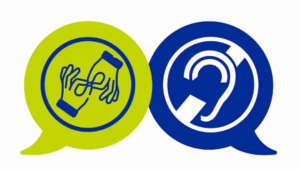Translation or Interpreting?
There is a lot of confusion surrounding the terms “interpreting” and “translation”. While both deal with translating one language into another, interpreting refers to facilitating communication in spoken language and translation refers to written text. Clients who are searching for language service providers sometimes mistake translation and interpreting services as more or less synonymous. You might think a certified translator would be just as good at handling an interpreting task. But remember, translation is an art form of taking a document or other text and taking its style, tone, and meaning from one language to another.
By contrast, interpreting requires feats of grammatical and social gymnastics during a spontaneous, usually face-to-face interaction; (though over-the-phone and video interpreting are also popular). And while many professionals are highly trained in both—some of them part of Global Arena’s network—the two activities require dramatically different skill sets.
Ask yourself, what do you need from a legal interpreter? Attention to detail is certainly still important in all situations. But rather than the word-for-word accuracy that matters in legal translation, interpreters must ensure that they capture the emotion and intention behind the conversation. Interpreters must be quick thinkers who can make judgment calls on which word to use at a moment’s notice. They must be familiar with jargon and the implications of choosing one way of phrasing information over another. You want to be sure the vendor understands your specific way of speaking your language, and that of the person you’re trying to communicate with. With specialist subject knowledge, you need someone who can quickly deduce how a doctor or lawyer is deploying their terminology. Fortunately, Global Arena has a broad variety of interpreters who are experts in these fields.

Why Do I Need Legal Interpreting Services?
The Constitution and Civil Rights Act affirm that participants in courtrooms have the right to understand what’s happening around them. This entails hiring an interpreter for cases that involve speakers of limited English proficiency. Cities with large immigrant populations like Philadelphia have dozens of languages spoken by anywhere from tens to thousands of residents. In legal proceedings with a plaintiff, defendant, or witness whose first language is rare or obscure, what do you do?
Any case that involves your company or organization requires the highest level of expertise from a qualified professional. Just like translators, interpreters can receive certification to verify their status as skilled language workers. The testing process and emphasis are different, but no less important, and legal interpreters face a unique challenge. They must be able to bridge courtroom vocabulary and everyday lexicon for the layman, both within and across languages. Rather than delegating that task to an untrained vendor, you need a provider who can vouch for their interpreters’ skill.
Furthermore, though all interpreters abide by a set of ethics, legal interpreters must adhere to an even higher standard. Just like all interpreters, legal interpreters must deliver the message of the original conversation without any alterations or omissions. They must maintain confidentiality. To ensure that legal proceedings are fair, interpreters must avoid conflicts of interest. They must treat all parties with impartiality, regardless of gender, race, or national origin. They must never give advice or offer any further services beyond their linguistic duty, and they must maintain a professional demeanor. Also, the court itself may make certain protocols that they require interpreters to adhere to depending on the case.
What Goes into My Choice of Interpreter?
For legal interpreting, consider the type of case (deposition, trial, etc.) and any relevant specialist subject matter (medical, business, etc.) Your interpreter will benefit from any background information you can give them, so that they can better tailor their work. Regardless of your own goals, an interpreter’s first duty is to limited English (or other language) speakers in the courtroom. The information you provide will help them help others to understand what’s going on. If you know what you are looking for, it is easier to find an individual who is suited to the work.
Over several years, Global Arena has grown a network of legal interpreters in dozens of languages spoken in the area.
If you need legal interpreting in Philadelphia, we can manage the process; working with you to find the perfect interpreter for your needs. While securing legal interpreting services might seem more trouble than it is worth, not having a highly trained and qualified interpreter can greatly complicate matters. A highly trained legal interpreter is a crucial member of your legal team and can make a world of difference in the outcome of your case. Our long-standing experience with the legal and linguistic realities of the city, plus a superb team of project managers, enables us to offer you the best solution. In the end, our goal is to ensure that your participation has been accurately and professionally represented. You can feel confident and satisfied that you’ve fulfilled your legal and ethical obligation with some of the most capable minds in the industry.




